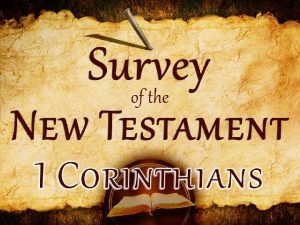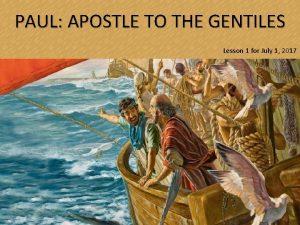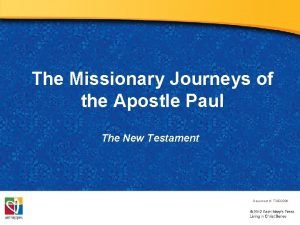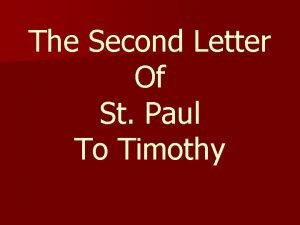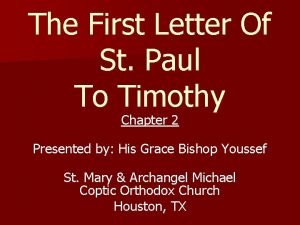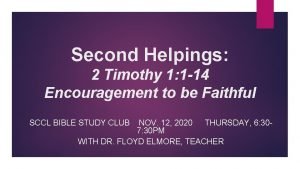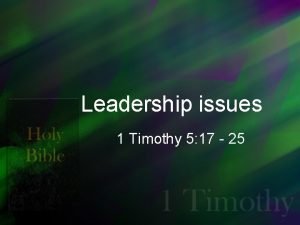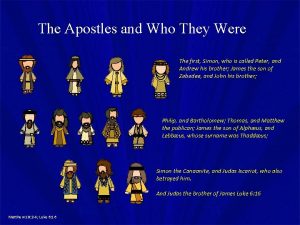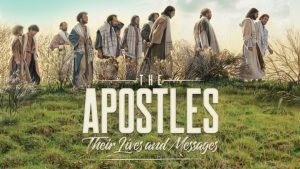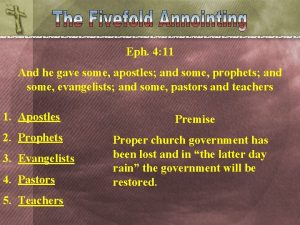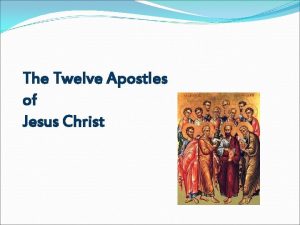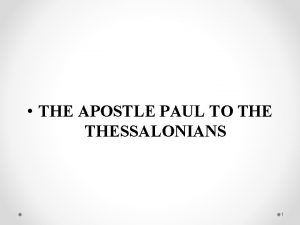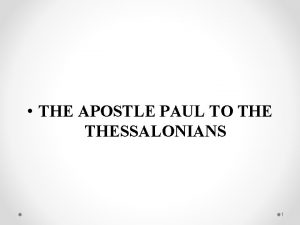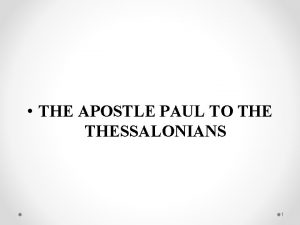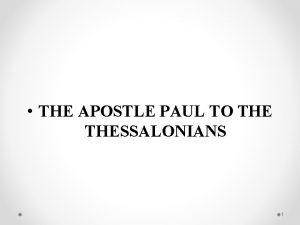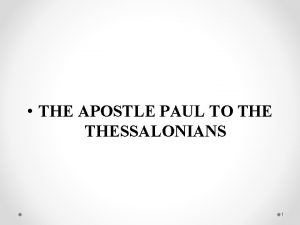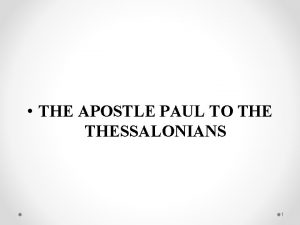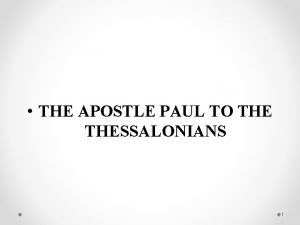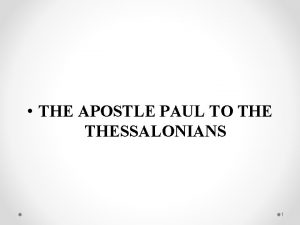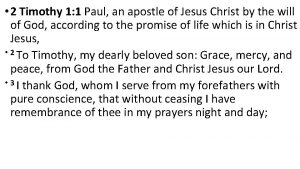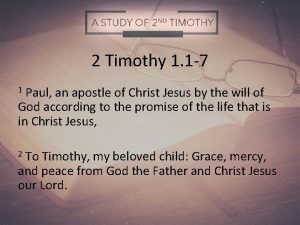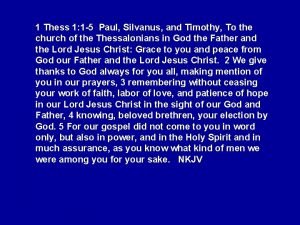Chapter 1 Paul Apostle Timothy Silvanus 1 Thessalonians








![Review from last week. 1 Thessalonians 1: 4 -6 [4] knowing, beloved brethren, your Review from last week. 1 Thessalonians 1: 4 -6 [4] knowing, beloved brethren, your](https://slidetodoc.com/presentation_image_h2/21a4d349a0419ff969ffc7e9c0671561/image-9.jpg)



![[sounded out] Greek: execheomai… to sound forth; publish. Only here. o From Thessalonica went [sounded out] Greek: execheomai… to sound forth; publish. Only here. o From Thessalonica went](https://slidetodoc.com/presentation_image_h2/21a4d349a0419ff969ffc7e9c0671561/image-13.jpg)
![[your faith to God is spread abroad] v Their faith and power were matters [your faith to God is spread abroad] v Their faith and power were matters](https://slidetodoc.com/presentation_image_h2/21a4d349a0419ff969ffc7e9c0671561/image-14.jpg)



- Slides: 17

Chapter 1

Paul Apostle Timothy Silvanus 1 Thessalonians 1: 1 Paul, Silvanus, and Timothy, To the church of the Thessalonians in God the Father and the Lord Jesus Christ: Grace to you and peace from God our Father and the Lord Jesus Christ. Companion Grace Unmerited favor Peace Church = Ekklesia Companion comes only when we are God’s friends.

Ø There was much for Paul to be thankful about. Ø They continued living as Christians during his forced absence from them and despite every outward obstacle. Ø ✦ “Give thanks is in the present tense, which indicates continuous action”. Ø ✦ “Always" qualifies "give thanks", and indicates that the thanksgiving is constant, not sporadic”. Ø ✦ Paul kept in mind their positive qualities — (Ro. 1: 8, 9; 1 Co. 1: 4; Ep. 1: 15, 16; Phi. 1: 3, 4; Col. 1: 3; Phile. 4. ) 1 Thess 1: 2 We give thanks to God always for you all, making mention of you in our prayers, Ephesians Romans 1: 15 -16 1: 8 Colossians 1: 3 1 Philemon Corinthians 1: 4 Philippians 1: 3 -4 1: 4 NKJV[15] Therefore NKJV[8] First, I I NKJV[3] I thank my NKJV[3] We give NKJV[4] I thank NKJV[4] I also, after I heard of thank my God upon every my Godinto always thanks the your faith the Lord thank my God, through Jesus remembrance of concerning you God and Father Jesus and your love Christ you all, you, [4]for always in making for all the saints, [16] the grace of offor our Lord Jesus that your faith is every prayer of do not cease to give mention of God which was Christ, praying spoken of mine making thanks for you, you always in given to you by throughout the always for you, request for you all making mention of Christ Jesus, whole with joy, my prayers, you in myworld. prayers:

v. Work of faith: v. Labor of love: v. Patience of hope: v. Our hope is rooted in Jesus Christ 1 Thes 1: 3 remembering without ceasing your work of faith, labor of love, and patience of hope in our Lord Jesus Christ in the sight of our God and Father,

v Work of faith: motivated by faith, they served the Lord — (Heb 5: 8, 9; 10: 29; 11: 1 -12: 2; Jam 1: 22; 2: 1426; Eph. 2: 8 -10; Tit. 2: 11 -14; etc. ) v Labor of love: strenuous, sacrificial effort spent for the well being of another — (Gal. 5: 6; Rom 13: 8 -12; 1 Jn 3: 16; Luke 10: 29 -37) v Patience of hope: active constancy in the face of difficulties, motivated by hope — (Rom 5: 4; 8: 18; Heb 6: 18 -19; Tit. 1: 2) v Our hope is rooted in Jesus Christ (1 Jn 3: 3; Phil 3: 20 -21; Ep. 1: 3 -14) 1 Thes 1: 3 remembering without ceasing your work of faith, labor of love, and patience of hope in our Lord Jesus Christ in the sight of our God and Father,

Brothers loved by God (ESV) — (Ro 1: 7; 2 Thes 2: 13; Jude 1; Dt 33: 12) Ø Knowing your election by God — “For we know. . . that he has chosen you” (ESV) — Ø God chose Christ - (Is. 42: 1) Ø God chose all in Christ - (Eph. 1: 4) Ø Not unconditional - (2 Pet. 1: 10) Ø Not apart from, or in violation of, our free will — (Rom 6: 16, 17; Eph. 1: 13; 2 This 2: 13, 14) Ø God chose the sphere, (Christ), God chose the power, (1: 5; Rom. 1: 16) 1 Thess 1: 4 knowing, beloved brethren, your election by God.

Ø Paul called his message “our gospel, ” because it was for him and all sinners to believe and especially for him to preach. Ø He knew it did not originate with him, but was divinely authored; thus he also called it “the gospel of God” (2: 2, 9; Rom. 1: 1). Ø Because the person who made forgiveness possible is the Lord Jesus, he also referred to it as “the gospel of Christ” (3: 2). Ø word only. It had to come in word (cf. Rom. 10: 13– 17), and not word only, but in Holy Spirit power (cf. 1 Cor. 2: 4, 5) and in confidence (cf. Is. 55: 11). Ø what kind of men. Ø The quality of the message was confirmed by the character of the lives of the preachers. 1 Thess 1: 5 For our gospel did not come to you in word only, but also in power, and in the Holy Spirit and in much assurance, as you know what kind of men we were among you for your sake.

“followers”. Ø Thessalonians had become third generation mimics of Christ is the first; Paul is the second; and the Thessalonians are third (1 Cor. 4: 16; 11: 1). joy of the Holy Spirit. Ø Rom. 14: 17. Ø Joy in the midst of suffering evidenced the reality of their salvation, which included the indwelling Holy Spirit (1 Cor. 3: 16; 6: 19). 1 Thess 1: 6 And you became followers of us and of the Lord, having received the word in much affliction, with joy of the Holy Spirit,
![Review from last week 1 Thessalonians 1 4 6 4 knowing beloved brethren your Review from last week. 1 Thessalonians 1: 4 -6 [4] knowing, beloved brethren, your](https://slidetodoc.com/presentation_image_h2/21a4d349a0419ff969ffc7e9c0671561/image-9.jpg)
Review from last week. 1 Thessalonians 1: 4 -6 [4] knowing, beloved brethren, your election by God. [5] For our gospel did not come to you in word only, but also in power, and in the Holy Spirit and in much assurance, as you know what kind of men we were among you for your sake. [6] And you became followers of us and of the Lord, having received the word in much affliction, with joy of the Holy Spirit,



They let their light shine — (Mat 5: 13 -16; Phil. 2: 14 -16; Rom. 12: 2) Ø They were evangelistic — Ø Mat. 28: 19 - “Go therefore and make disciples of all the nations, baptizing them in the name of the Father and of the Son and of the Holy Spirit, . . . ” Ø Mark 16: 15 - “Go into all the world and preach the gospel to every creature. . ” Ø Acts 8: 4 - “Therefore those who were scattered went everywhere preaching the word. . ” 1 Thess 1: 7 so that you became examples to all in Macedonia and Achaia who believe.
![sounded out Greek execheomai to sound forth publish Only here o From Thessalonica went [sounded out] Greek: execheomai… to sound forth; publish. Only here. o From Thessalonica went](https://slidetodoc.com/presentation_image_h2/21a4d349a0419ff969ffc7e9c0671561/image-13.jpg)
[sounded out] Greek: execheomai… to sound forth; publish. Only here. o From Thessalonica went ministers preaching and confirming the Word of God in Macedonia, Greece, and many other places. o This indicates a healthy New Testament church, fulfilling the great commission (Mt. 28: 19 -20 Mk. 16: 15 -20 Lk. 24: 47; Jn. 17: 17 -19 Acts 1: 4 -8). o Then, too, merchants went from Thessalonica to all parts, taking the news that the people had believed. 1 Thess 1: 8 For from you the word of the Lord has sounded forth, not only in Macedonia and Achaia, but also in every place. Your faith toward God has gone out, so that we do not need to say anything.
![your faith to God is spread abroad v Their faith and power were matters [your faith to God is spread abroad] v Their faith and power were matters](https://slidetodoc.com/presentation_image_h2/21a4d349a0419ff969ffc7e9c0671561/image-14.jpg)
[your faith to God is spread abroad] v Their faith and power were matters of conversation among the heathen. v If they had manifested only a formal confession of faith without the power they would not have been model saints for other churches. 1 Thess 1: 8 For from you the word of the Lord has sounded forth, not only in Macedonia and Achaia, but also in every place. Your faith toward God has gone out, so that we do not need to say anything.

turned. Ø This word describes what the Bible elsewhere calls repentance (Matt. 3: 1, 2; 4: 17; Acts 2: 38; 3: 19; 5: 31; 20: 21). Ø Salvation involves a person’s turning from sin and trusting in false gods to Christ. 2 Cor. 7: 8– 11. to serve the living and true God. Ø Those converted to Christ abandoned the worship of dead idols to become willing slaves to the living 1 Thess 1: 9 For they themselves declare concerning us what manner of entry we had to you, and how you turned to God from idols to serve the living and true God,

to wait. o This is a recurring theme in the Thessalonian letters (3: 13; 4: 15– 17; 5: 8, 23; 2 Thess. 3: 6– 13; cf. Acts 1: 11; 2 Tim. 4: 8; Titus 2: 11– 13). o These passages indicate the imminency of the deliverance; it was something Paul felt could happen in their lifetime. delivers us from the wrath to come. o This can mean to evacuate out of a current distress (Rom. 7: 24; Col. 1: 13) or to exempt from entering into a distress (John 12: 27; 2 Cor. 1: 10). 1 Thessalonians 1: 10 and to wait for His Son from heaven, whom He raised from the dead, even Jesus who delivers us from the wrath to come.

v The wrath here is God’s eternal wrath that will come to those who hate the Lord and did not obey the call of the Goepel (John 3: 36; Rom. 5: 9, 10). v First Thessalonians 5: 9 develops the same idea v The emphasis in both passages on Christ’s work of salvation from sin favors this being understood as the deliverance from the eternal wrath of God in 1 Thessalonians 1: 10 and to wait for His Son from heaven, whom He raised from the dead, even Jesus who delivers us from the wrath to come.
 Paul defends his role as a true apostle of
Paul defends his role as a true apostle of Apostle paul's third missionary journey map
Apostle paul's third missionary journey map Paul the apostle to the gentiles
Paul the apostle to the gentiles The missionary journeys of the apostle paul
The missionary journeys of the apostle paul The last apostle
The last apostle Second letter of st paul to timothy
Second letter of st paul to timothy Letter of st paul to timothy
Letter of st paul to timothy Timothy p. schmalz
Timothy p. schmalz Paul to timothy encouragement
Paul to timothy encouragement Paul's letter to timothy on leadership
Paul's letter to timothy on leadership Matthias apostle facts
Matthias apostle facts St thomas the apostle biography
St thomas the apostle biography Apostle peter death
Apostle peter death Apostle definition
Apostle definition How jesus apostles died
How jesus apostles died He gave some apostle
He gave some apostle The apostle whose symbol is a fish lying on a bible
The apostle whose symbol is a fish lying on a bible Apostle creed prayer
Apostle creed prayer

